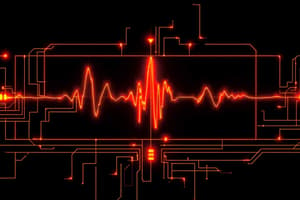Podcast
Questions and Answers
Which factor is used to correct for the geometry of the coil in the back emf derivation?
Which factor is used to correct for the geometry of the coil in the back emf derivation?
- Distribution factor (Kd)
- Coil span factor (Kc) (correct)
- Flux per pole (Φ)
- Number of turns per phase (Tph)
What represents the total flux cut by each conductor during one revolution in the back emf formula?
What represents the total flux cut by each conductor during one revolution in the back emf formula?
- Kc
- ΦP (correct)
- N
- Zph
What is the average emf induced per phase dependent on?
What is the average emf induced per phase dependent on?
- Speed (N) only
- Number of turns (Tph) only
- Time taken for each revolution
- Flux cut by conductors and the number of conductors (Zph) (correct)
How do you calculate the time taken to complete one revolution in relation to speed?
How do you calculate the time taken to complete one revolution in relation to speed?
What is the relationship between the number of turns connected in series per phase (Tph) and the number of conductors (Zph)?
What is the relationship between the number of turns connected in series per phase (Tph) and the number of conductors (Zph)?
Flashcards
Back EMF (Eb)
Back EMF (Eb)
Electromotive force induced in a rotating machine, opposing the applied voltage.
Phasor Diagram
Phasor Diagram
A diagram representing vector quantities (like voltage and current) in AC circuits or machines.
Under Excitation
Under Excitation
A condition in a synchronous generator where the field excitation is less than the required level.
Flux per pole (Φ)
Flux per pole (Φ)
Signup and view all the flashcards
Speed (N)
Speed (N)
Signup and view all the flashcards
Study Notes
Phasor Diagram for Load Condition (Under Excitation)
- Under load conditions with constant excitation, current increases, and power factor decreases.
- The angle φ (phase angle) increases.
Derivation for Back EMF (Eb)
-
Variables:
p= Number of poles∅= Flux per pole (in Webers)N= Speed in revolutions per minutef= Frequency in Hertz (Hz)Z<sub>ph</sub>= Number of conductors connected in series per phaseT<sub>ph</sub>= Number of turns connected in series per phaseK<sub>c</sub>= Coil span factorK<sub>d</sub>= Distribution factor
-
Flux cutting: Each conductor cuts flux during one revolution.
-
Time for one revolution: Time taken for one revolution = 60/N seconds
-
Average EMF induced per conductor: (ΦpNx60)/60
-
Average EMF induced per phase: (ΦpNx2Zph)/60
-
Where N is speed.
Studying That Suits You
Use AI to generate personalized quizzes and flashcards to suit your learning preferences.
Description
Test your understanding of phasor diagrams under load conditions and the derivation of back EMF. This quiz covers key concepts such as phase angle changes and variables affecting electromagnetic forces in electrical engineering. Explore how these factors influence power systems and electrical machinery.





